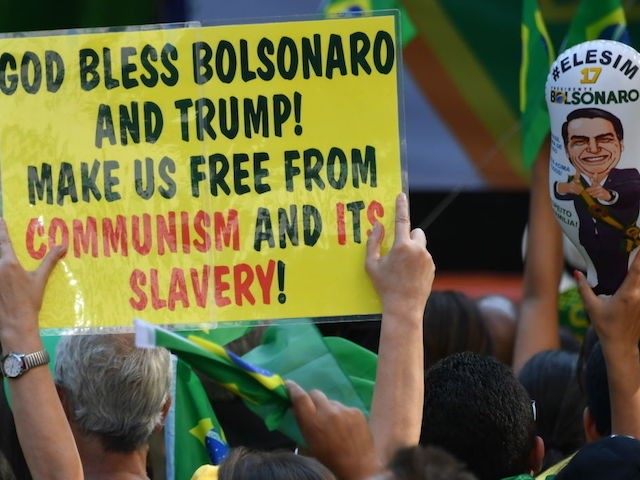Brazil inaugurated Jair Bolsonaro, a far-right conservative who campaigned on a platform of smaller government and fighting socialism, as its president on Tuesday. In his first speech in office, Bolsonaro urged Brazilians to “dream” while remaining vigilant of the threats of socialism.
“I stand before the entire nation today, the day in which the people began to free themselves of socialism, the inversion of values, state maximalism, and the politically correct,” Bolsonaro declared, opening a speech heavy on Christian references and optimistic in tone. “We cannot allow nefarious ideologies to come and divide Brazilians – ideologies that destroy our values and traditions, destroy our families, the foundations of our society.”
“I am also here to renew our hopes and remind everyone that, if we work together, this change will be possible,” he assured the public, noting that his sound defeat of socialist Workers’ Party (PT) candidate Fernando Haddad in October’s presidential election “gave voice to those that went unheard, and the voice of the streets and the ballots were very clear.”
The former Congressman and army captain repeated his campaign slogan – “Brazil above everything, God above everyone” – and addressed the green and yellow Brazilian flag.
“That is our flag, which will never be red. It will only be red if it is necessary for our blood to keep her green and yellow,” he declared.
On the issues facing Brazil, Bolsonaro focused on corruption, widespread crime, education, and the sluggish economy, hindered by over 16 years of socialism under the PT. He suggested that his administration would not shy away from using “our abundant mineral resources, our fertile lands bless by God, and our marvelous people” to enrich society.
“Brazilians can and should dream,” he suggested. “Dream of a better life, with better conditions to enjoy the fruit of their labor through meritocracy. And of a government that is honest and efficient.”
He noted that his campaign was the “cheapest” successful one in history, an allusion to his lack of connections to the Brazilian political establishment. While Brazil has dozens of active political parties, three to four of them typically control Congress and the presidency. Bolsonaro’s Social Liberal Party (PSL) is not one of them.
Bolsonaro also vowed to “prioritize basic education,” “the right to property and legitimate defense” – a reference to his support for individual gun ownership – and to value police and other rescue workers.
He ended his speech by thanking “God for being alive and you all who prayed for me and my health in the most difficult moments.”
Bolsonaro nearly lost his life in an assassination attempt in September. During a campaign rally in Minas Gerais, one of Brazil’s poorest regions, a man later identified as a self-declared socialist stabbed Bolsonaro in the abdomen. The then-presidential candidate was forced off the campaign trail and endured multiple sensitive surgeries to reconstruct his digestive tract, which the assailant had slashed through. The man arrested for the crime told police that he was “ordered by God” to kill Bolsonaro.
Bolsonaro’s survival has heralded in a pro-American, anti-socialist government in Brazil dedicated to reducing the size of government and reconstructing diplomatic ties with capitalist nations. Following his inauguration, Bolsonaro and his senior cabinet members met with American Secretary of State Mike Pompeo to discuss bilateral ties and, in particular, how to address the failed state of Venezuela, which borders Brazil and sends thousands of refugees into the country on a daily basis.
Bolsonaro told Pompeo – speaking “captain to captain,” as both held the title in their respective militaries – that he hopes to see the U.S. and Brazil become closer friends, while Pompeo relayed that President Donald Trump “is very pleased with the relationship that our two countries are on the precipice of beginning to develop.”
Domestically, Bolsonaro has vowed to eradicate government corruption, a widespread concern following the revelations of “Operation Car Wash,” a police investigation that revealed an intricate scheme to overpay private corporations on public infrastructure programs. Part of the extra cash went back into the hands of the politicians that made the deal possible, including former President Luiz Inácio Lula da Silva, currently serving a 12-year prison term for corruption.
Bolsonaro made the judge responsible for most of the Operation Car Wash indictments, Sergio Moro, his new minister of justice. During remarks following his installation as minister, Moro vowed that Brazil “will not be a safe haven for terrorists,” nor will the nation “ever return to denying cooperations to countries who demand it” on corruption cases.
Brazil’s O Globo newspaper notes that Moro faces a crippling budget at the Justice Ministry and the wrath of a variety of criminals, organized crime syndicates, and allies of powerful corrupt politicians in his campaign to bring them to justice. Among Moro’s most pressing concerns is Brazil’s lack of specific anti-corruption laws, which politicians often use to get free after getting caught. To fix that problem, the newspaper notes, Moro needs Congress to legislate the laws his needs into reality – a difficult task given that even the nation’s House Speaker went behind bars for his role in Operation Car Wash.
“It will be a long and difficult road,” O Globo notes. “Bolsonaro will already have to lend his political capital to advance the economic agenda in Congress” Corruption stands to take a back seat to a litany of more pressing problems to legislators.

COMMENTS
Please let us know if you're having issues with commenting.